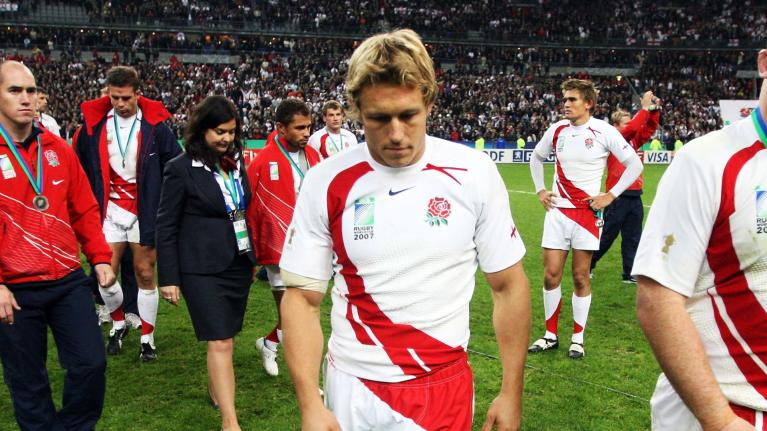Jonny Wilkinson opens up over mental demons

England's 2003 Rugby World Cup hero and all-time great flyhalf Jonny Wilkinson has opened up in a telling interview with the Express over mental health issues he dealt with during his illustrious rugby career.
Wilkinson recounts a time at Toulon pre-match where he was locked away in a toliet cubicle moments before kickoff, trying to seek assurance from his kicking coach and psychological guru Dave Alred on the phone.
“I’d shut myself in the cubicle so no one could see what I was doing. You don’t make phone calls from the changing room just before a game. You just don’t,” recalls Wilkinson.
“The team was outside in a huddle waiting for me. I was supposed to be giving the ‘come on we can do this’ speech and I was a shivering wreck in the toilet.
“So I was crouched down phoning Dave. And of course he wasn’t there. Why should he be? So I’m stuck in the cubicle with the phone and I can hear the team manager saying, ‘Where’s Jonny? We’ve got to go out in two minutes’.”
His battles with anxiety threatened to consume him throughout his career as he recalls.
“I had mental health stuff throughout my entire life,” he said. “I had times when I’d be speaking to my family before England games from the team hotel where I was inches away from going to tell the coach I couldn’t play. Make up an excuse not to. That was the state I was in. It was pure panic. Chaos.
I’d be sat in the hotel room trying to watch TV but it was just a light changing colour. I was so anxious because I needed to know everything would go how I wanted it to – 95 per cent of me was trying to live in the future.”
The strikingly bold confessions give insight into the reality of Wilkinson's life, despite being one of the all-time greats and kicking the drop goal that won a Rugby World Cup, he struggled on a day-to-day basis.
“I had this amazing house in the quiet countryside with a jaccuzi. I had a roof over my head, money, people looking after me – I had everything I could possibly need. I was sat in that jacuzzi and I could not have been less happy,” he says.
Mental health in professional sport is increasingly becoming more acceptable to talk about as the realities of the illness become more understood.
“The nature of sport is that you live constantly between two pillars of judgment – your last game and your next game,” says Wilkinson. “There are thousands of people watching, people writing about you, people stopping you in the street, and it’s easy to use that to reinforce that image of who you are.
Read the full interview at the Express here.
Latest Comments
When I came up with my groundbreaking gadget, I was excited but unsure how to secure a patent. I found “Innovate Legal,” a firm promising guaranteed patent protection for $3,000,Trusting them, I paid the fee, but months passed with no updates. Their vague responses raised concerns, leading me to seek help from ASSET RESCUE SPECIALIST. They discovered Innovate Legal never filed my patent and had scammed me. With their guidance, I filed a chargeback and recovered my full $3,000, Though the experience was devastating, it taught me invaluable lessons. Now, my invention is patent-pending, thanks to ASSET RESCUE SPECIALIST.
FOR MORE DETAILS:
Company: ASSET RESCUE SPECIALIST
Website info; https://assetrescuespecialist.com
mail: assetrescuespecialist@qualityservice.com or
support@assetrescuespecialist.com.
WhatsApp:+ 1 9 0 3 5 5 9 1 7 3 3.
Go to commentsScanner Hackers CryptoRecovery, a reputable cryptocurrency recovery service, employs a comprehensive approach to recover stolen cryptocurrency. Here's a step-by-step overview of their recovery process: ## Initial Assessment 1. Case Evaluation: Scanner Hackers Recovery evaluates the case to determine the likelihood of recovery. 2. Information Gathering: They collect relevant information, such as transaction IDs, wallet addresses, and any other pertinent data. ## Blockchain Analysis 1. Transaction Tracking: Scanner Hackers Recovery uses advanced blockchain analysis tools to track the movement of the stolen cryptocurrency. 2. Address Clustering: They identify clusters of addresses associated with the stolen funds. 3.Transaction Pattern Analysis: Scanner Hackers Recovery analyzes transaction patterns to identify potential leads. ## Recovery Strategy 1. Customized Recovery Plan: Based on the analysis, Scanner Hackers Recovery develops a customized recovery plan. 2. Collaboration with Exchanges: They work with cryptocurrency exchanges to freeze and recover stolen funds. 3. Law Enforcement Coordination: Scanner Hackers Recovery coordinates with law enforcement agencies to track down and prosecute perpetrators. ## Recovery Execution 1. Recovery Operations: Scanner Hackers Recovery executes the recovery plan, using various techniques to recover the stolen cryptocurrency. 2. Wallet Recovery: They recover access to the wallet and secure the funds. 3. Fund Transfer: Scanner Hackers Recovery transfers the recovered funds to a secure wallet. ## Post-Recovery 1. Secure Storage: Scanner Hackers Recovery ensures the recovered funds are stored securely. 2. Client Updates: They provide regular updates to the client throughout the recovery process. 3. Documentation: Scanner Hackers Recovery maintains detailed records of the recovery process. Please note that the success of the recovery process depends on various factors, including the complexity of the case and the cooperation of law enforcement and exchanges. Contact
email: info@scannerhacktech.com
Whatsapp: +14318017493
Website: https://scannerhacktech.com/
Go to comments